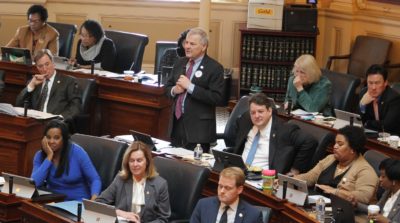“Crossover” is the term used to describe the date that bills in the House need to be passed and moved to the Senate for consideration, and vice versa. Any bills that were not sent to the other body by yesterday (February 13) are dead for this Session. On Monday and Tuesday, we considered a number of controversial bills, not the least of which were measures involving possible re-regulation of utility rates and new requirements for Medicaid recipients.
UTILITY RATES – Defeating The Double Dip
Citizens have been reading for months about problems with the so-called “rate freeze” bill that was passed in 2015, and the General Assembly is now trying to fix it. A straight repeal of the 2015 measure failed in both houses, leaving only HB 1558 as a possible alternative. But that bill was fundamentally flawed when first introduced; it permitted utilities to keep much of their “overearnings” and left them largely free of State Corporation Commission (SCC) oversight. While the efforts of environmental and consumer groups made the bill that was considered on the House floor on Mondayand Tuesday noticeably better, it remained seriously deficient in several categories, including provisions that would have allowed the utility companies to enhance their profits with the so-called “double count” or “double dip.”
Last week, I set up an online survey for my constituents, and the greatest concern expressed was about the “double dip.” With that in mind, I successfully offered and supported an amendment on the House floor to eliminate it, which passed with bipartisan support (55-41 on the first vote, and then 96-1 on a revote). You can read an article in the Huffington Post about this here. This was a huge victory for consumers, and one that is rarely seen on the House floor. You can watch a video of the first part of the House debate on HB 1558 including my amendment here.
The amendment made the bill much better, but my concerns about the SCC’s relative inability to regulate utilities remain, and I therefore voted “no” on this version of the bill. It is possible that additional improvements could be made as the bill continues its path through the session, and I will keep an open mind and a watchful eye as the process goes on.
 My online survey about HB 1558 revealed very strong support for the following portions of the bill:
My online survey about HB 1558 revealed very strong support for the following portions of the bill:
1. Incentives for renewables.
2. Provisions to return “overearnings” to consumers.
3. Investments in energy efficiency and weatherization.
4. Improvements and modernization of the grid.
MEDICAID—Update on Expansion Efforts
The discussions continue on how best to expand healthcare access to larger numbers of Virginians. For now, the only significant piece of Medicaid legislation that has passed is one that has been proposed by Republicans and which is designed to create something that approximates a “work requirement.” Under this requirement, a condition of Medicaid eligibility would be that people seeking it are either looking for work, in job training, or are not “able-bodied.” While these requirements would not apply to persons who are medically and mentally frail, pregnant women, children, the disabled, or the elderly, they could still affect a large number of people who could be denied access to healthcare. I came to Richmond this winter to expand healthcare access; this bill would reduce healthcare access and make fewer people eligible for Medicaid. Consequently, I voted against the bill. Nonetheless, I remain cautiously optimistic that we will be able to do something by the end of session to expand access. The legislative process is a long and winding one, and it is sometimes difficult to predict what will happen two or three weeks from now. I will keep fighting to expand access and I appreciate your support as I do so.
MY OTHER BILLS
Several of my bills have now passed the House and have moved on to the Senate for consideration. Among the most significant is a study (HJ101) of how best to change our state regulations and provide incentives in the area of energy storage. Energy storage can be significant because it allows people to dispatch energy from renewable sources when the sun doesn’t shine and the wind doesn’t blow. It is the future, and the results of this study will provide Virginia with tools to capitalize upon that.
My bill to expand the collection of DNA samples from individuals convicted of certain misdemeanor offenses was also passed to the Senate. DNA is a powerful tool that can help convict the guilty and exonerate the innocent. Under my bill, DNA will be collected from persons who have been convicted of certain misdemeanor offenses. No samples can be collected unless a person is convicted of the crime. The Virginia State Crime Commission conducted the study on which this bill was based and found a relationship between certain misdemeanors added to the list and later felony convictions.
HB 1262 is a bill that will allow the state to donate vehicles to the community college foundations as part of their worker training initiatives to help people get to and from their jobs. HB 1017 will allow our local school divisions to resume control over after-school programs attended by public school children and staffed by employees of the public schools, without the worrying costs of DSS licensure. This will allow more youngsters to be served at lower costs to the localities. Finally, HB 360 provides some financial assistance for the Daughters of Zion Cemetery to support efforts to reclaim certain gravesites.
Let Us Hear From YOU!
It is a pleasure representing the 57th District in the General Assembly. If you are in Richmond over the next few weeks visit with us in Room E601 of the Pocahontas Building, 900 East Main Street. This is the temporary home of the General Assembly for the next few years as the new General Assembly building is constructed.
